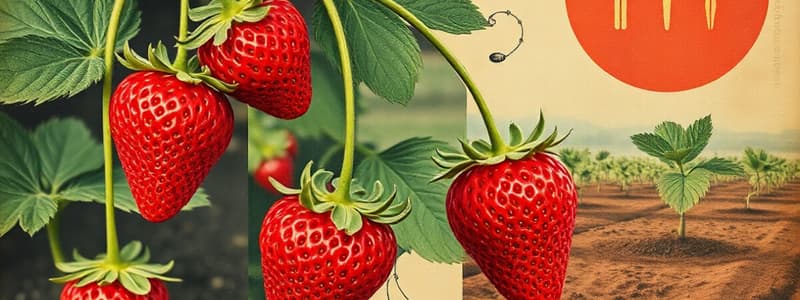Podcast
Questions and Answers
What is the hybrid name of the garden strawberry?
What is the hybrid name of the garden strawberry?
- Fragaria virginiana
- Fragaria chiloensis
- Fragaria vesca
- Fragaria × ananassa (correct)
How many acres of strawberries were harvested in the US according to the 2012 data?
How many acres of strawberries were harvested in the US according to the 2012 data?
- 70,000 acres
- 60,000 acres
- 56,140 acres (correct)
- 45,500 acres
What is the primary reason the greenhouse strawberry industry has not significantly developed in the US?
What is the primary reason the greenhouse strawberry industry has not significantly developed in the US?
- Limited knowledge about greenhouse techniques
- High production costs (correct)
- Lack of consumer demand
- Insufficient research funding
Which propagation method involves using young plantlets that are stored at low temperatures?
Which propagation method involves using young plantlets that are stored at low temperatures?
What do frigo plants allow in terms of strawberry production?
What do frigo plants allow in terms of strawberry production?
Which method of propagation is also known as 'fresh green plants'?
Which method of propagation is also known as 'fresh green plants'?
What characteristic is crucial for the storage of frigo plants?
What characteristic is crucial for the storage of frigo plants?
Which of the following regions is NOT mentioned for European protected strawberry culture?
Which of the following regions is NOT mentioned for European protected strawberry culture?
How long does rooting occur for rooted runner plugs under frequent misting?
How long does rooting occur for rooted runner plugs under frequent misting?
What is the purpose of removing flowers and runners during the nursery stage of dormant runner plants?
What is the purpose of removing flowers and runners during the nursery stage of dormant runner plants?
What is the recommended nutrient ratio for maintaining potassium in strawberry cultivation?
What is the recommended nutrient ratio for maintaining potassium in strawberry cultivation?
What type of substrates is suggested for strawberry cultivation to ensure high porosity?
What type of substrates is suggested for strawberry cultivation to ensure high porosity?
Which of the following flowering habits is NOT suitable for strawberries?
Which of the following flowering habits is NOT suitable for strawberries?
What is the ideal pH range for strawberry substrates?
What is the ideal pH range for strawberry substrates?
How frequently can irrigation occur for strawberries in a greenhouse?
How frequently can irrigation occur for strawberries in a greenhouse?
What is a major concern regarding strawberry roots in substrate culture?
What is a major concern regarding strawberry roots in substrate culture?
Which of the following is NOT a common issue with post-harvest strawberries?
Which of the following is NOT a common issue with post-harvest strawberries?
What is a common method of irrigation used for strawberries?
What is a common method of irrigation used for strawberries?
Which nutrient is particularly critical for fruiting in strawberries?
Which nutrient is particularly critical for fruiting in strawberries?
What type of production system is suggested for strawberry cultivation?
What type of production system is suggested for strawberry cultivation?
Flashcards
Fragaria × ananassa
Fragaria × ananassa
A hybrid strawberry plant, created from F. virginiana and F. chiloensis.
Greenhouse strawberry production
Greenhouse strawberry production
Growing strawberries indoors, in controlled environments like greenhouses.
Rooted runner plugs
Rooted runner plugs
Young, rooted strawberry plantlets used for propagation. These are not stored before being planted.
Frigo plants
Frigo plants
Signup and view all the flashcards
Dormant runner plants
Dormant runner plants
Signup and view all the flashcards
US strawberry production
US strawberry production
Signup and view all the flashcards
US strawberry harvested acreage
US strawberry harvested acreage
Signup and view all the flashcards
European protected strawberry culture
European protected strawberry culture
Signup and view all the flashcards
Propagation methods
Propagation methods
Signup and view all the flashcards
Off-season strawberry production
Off-season strawberry production
Signup and view all the flashcards
Seed propagation
Seed propagation
Signup and view all the flashcards
Strawberry substrate
Strawberry substrate
Signup and view all the flashcards
Strawberry Substrate Mix
Strawberry Substrate Mix
Signup and view all the flashcards
Strawberry Irrigation
Strawberry Irrigation
Signup and view all the flashcards
Potassium (K) in Strawberries
Potassium (K) in Strawberries
Signup and view all the flashcards
Iron (Fe) Deficiency
Iron (Fe) Deficiency
Signup and view all the flashcards
Strawberry Flowering Types
Strawberry Flowering Types
Signup and view all the flashcards
Strawberry Post-Harvest Handling
Strawberry Post-Harvest Handling
Signup and view all the flashcards
Botrytis
Botrytis
Signup and view all the flashcards
Strawberry Production Systems
Strawberry Production Systems
Signup and view all the flashcards
Study Notes
Strawberry Cultivation
- Strawberries (Fragaria × ananassa) are a hybrid of F. virginiana and F. chiloensis. They are cultivated from wild species. A shift from wild to cultivation began in the 1300s.
- US strawberry production is high, at 3 billion pounds annually (2012 data). The acreage harvested is 56,140 acres (2012). A small greenhouse area is 22 acres (2009).
- European protected strawberry culture is significant in several countries like the Netherlands (125 ha), Belgium (200 ha), Italy (150 ha), and parts of Northern France, UK, Switzerland, Germany, and Austria.
Propagation Methods
- Rooted Runner Plugs (Fresh Green Plants): These are rapidly rooted cuttings that are frequently misted. They grow to 3-5 true leaves and reach a 1cm+ crown diameter.
- Frigo plants: One-year-old plants dug from the field, trimmed, and stored at -2°C for months. These plants often have flower buds and yield fruit quickly, though some cultivars are less suitable for this storage method.
- Dormant Runner Plants: Young plantlets are dug in fall and stored at 2-4°C for spring planting. Runners and flowers from this nursery stage should be removed.
- Seeds: Development from crossing near-isogenic lines offers potential but is challenging. Seed-propagated cultivars are gaining interest.
Production Systems and Substrates
- Gutters and Modified Dutch Buckets: Common irrigation and planting methods using porous media needing frequent irrigation.
- Substrates: Strawberries need high oxygen levels in their root zone. A mixture of 50% perlite, 25% coconut coir, and 25% peat is recommended. Maintain pH 5.5–6.0 and electrical conductivity (EC) up to 1.0. (sensitive to high salts).
- Irrigation: Strawberries need consistent moisture. Common practice is pulse irrigation (about 33 mL per watering). Watering frequency varies depending on greenhouse conditions and plant growth.
Mineral Requirements and Flowering
- Potassium (K) and Iron (Fe): Important nutrients for growth. Maintain a N:K ratio of 1:1.7 or 1:2. Cool temperatures can trigger iron deficiencies.
- Flowering Habits: Strawberries have three types of flowering habits: day-neutral, short-day, and long-day.
Pests and Diseases
- Botrytis: A major shoot pathogen.
- Phytophthora: A significant root zone pathogen.
- Non-recirculating nutrient solutions: Used in substrate culture to prevent issues.
- Individual containers (BATO buckets): Compared to gutters (or NFT or deep flow), each has its own benefits concerning substrate use.
Post-Harvest Handling
- Strawberries are delicate and easily bruise. Handle them carefully.
- Avoid hydro-cooling as Botrytis is more likely to occur.
Conclusion
- Strawberries are a profitable greenhouse crop.
- While growing is not easy, the high value and interest in them make the effort worthwhile.
Studying That Suits You
Use AI to generate personalized quizzes and flashcards to suit your learning preferences.




